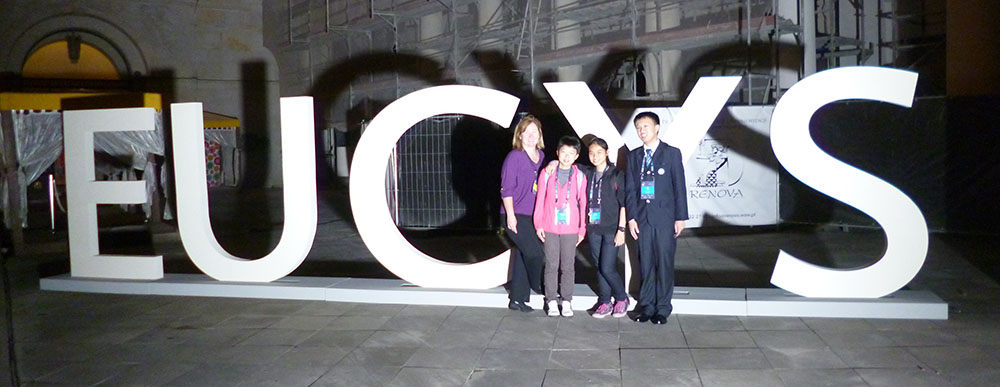Intel ISEF 2014 Finalist, Yue Yao, Travels to Poland as Recipient of a Grand Award Trip

Yue Yao, an Intel ISEF 2014 finalist, had never traveled alone outside of China. That changed after Intel ISEF, where Yao won a Grand Award, a free trip to the European Union Contest for Young Scientists (EUCYS) held in Poland.
For the first time, Yao set out on his own to a foreign country to connect with fellow young scientists. In September, Yao presented his project on an optical computer design among 110 fellow contestants from around the world who came to Warsaw to share their research.
What was your experience being an Intel International Science and Engineering Fair finalist like? Most memorable moments?
I can hardly forget any minute of the week in Los Angeles for Intel ISEF. Thankfully, I got the prototype of my optical computer to work properly by the time the first judge came.
The most memorable moments were the talks with judges and other finalists. It was fantastic to chat with these brilliant minds on the topic of science. I still remember a judge from the U.S. Army who introduced himself in Chinese. Two judges from the Society of Photo-optical Instrumentation Engineers (SPIE) warmly invited me to take photos with them. Another judge joked, “If you start-up a company on the optical computer, please hire me!” Another highlight was becoming friends with Joshua Hellerstein, a finalist from Florida, who was recently admitted into MIT.
And what’s more, the judges gave me a lot of useful advice and asked me questions which I’m still thinking about today. I intend to write emails soon to some judges about my latest thoughts on the theory of optical computers.
I was so happy, because my theory has never been accepted by so many experts. Intel ISEF was the first time to enjoy my work, after spending a year conducting research and receiving mostly criticism on it.
Can you provide a short description of your Intel ISEF project?
For my project, I designed a new method for optical digital computing. It might be a promising optical computer design, with computing speeds up to 300 times faster than the electronic computer.
 How did you feel when you found out you won a trip to EUCYS?
How did you feel when you found out you won a trip to EUCYS?
To be honest, I was already overwhelmed with shock and excitement to win first place in computer science. The award of the trip to EUCYS shocked me again- I was just so excited. I kept laughing because I couldn’t speak. I had never travelled to Europe before, let alone a solo trip to another science contest.
Can you tell us about that experience? What was a highlight of your trip?
The experience of EUCYS was full of beautiful scenes in Warsaw, and delightful new friends. At EUCYS, there were three judging days. The judges, teachers, student helpers and contestants were just like neighbors living on the same block.
I enjoyed being surrounded by science enthusiasts. I remember the lecture by Professor Yann Ollivier, who was a former EUCYS contestant, about his growth through science. Recently, he has been researching artificial intelligence.
I enjoyed getting to know the student volunteers, like Marcin Metrycki, a freshman in Economics at Warsaw University. We played puzzles together in the science museum. I also appreciated meeting Szymon Siemianowski, a librarian in Warsaw University who majored in Math, who read my paper many times throughout the three days. I had such a great experience with these people in Warsaw that I’m planning to learn Polish over this summer vacation to make sure I can stay in touch with the people I met.
How have your Intel ISEF and EUCYS experiences affected your future goals?
My experiences at Intel ISEF and EUCYS enhanced my research curiosity. These days, I am learning the theory of quantum computers, so I’m revising my theory again. A professor at Shanghai University suggested I publish my Intel ISEF paper, but I want to wait to publish until I am more satisfied with the results of my research.
Do you have any advice for other young students interested in science?
I hope other young students have the endurance and bravery to persevere researching theories they believe to be true. I have to remind myself of the same advice as well.
During my year of research, many professors said no to me. Many experts did not believe in my theory, did not support my research, and were full of criticism. No matter what they said, I held on to the possibility that I was on to something, and I know that I need to prove it.
This makes me think of the quote from the Imitation Game trailer, “Sometimes it is the people no one imagines anything of who do the things that no one can imagine.”


